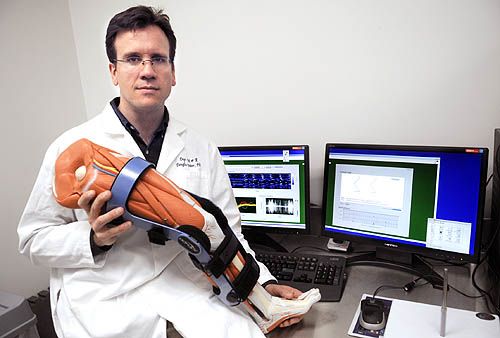For Students
STEM Jobs- 3. Biomedical Engineer
Admin Aug 23, 2022 03:21 PM

TAGS
Biomedical engineering is an innovative and cutting-edge field that allows those who work in it to play a key role in the development of systems, software, and equipment that can cure significant medical problems and potentially save lives. This combined with the fact that specializations (such as genetic engineering ,bioinstrumentation, rehabilitation engineering, and medical imaging etc) can be tailored to an individual's personal interests, makes it a top contender among STEM students looking for a promising and interesting career in the sciences after graduation. Furthermore, on an international level, Forbes has named biomedical engineering the "Best Job in America," making it an excellent choice for any student with an interest in engineering and biological sciences.
The fact that biomedical engineering comes with an excellent annual compensation package makes it even more tempting. Furthermore, approximately 10,000 employment for biomedical engineers are likely to be produced in research and development labs during the next decade. Biomedical engineers will collaborate in these public and commercial facilities to create everything from new medical equipment (including artificial limbs and organs in certain situations) to software that makes it easier for doctors to examine results from complex medical devices like MRIs. Many new graduates will be able to find a place in this fascinating and competitive industry thanks to the over 62 percent increase in growth over the last ten years.
Education and Training
Students must complete a bachelor's degree programme in biomedical engineering or enhance undergraduate study in another subject with a graduate-level degree in biomedical engineering to work as a biomedical engineer. Students should take classes in chemistry, physics, biology, mathematics, mechanical drawing, and computer programming during their studies to ensure that they are familiar with all of the principles that will be needed in their future jobs. Many certified biomedical engineering schools also involve engineering design training, which is an important part of preparing for a job. A student who takes an additional subject from the engineering discipline will stand out since they will have more depth in their engineering field.
Advanced degrees in biomedical engineering, such as a master's or Ph.D., are not generally required to work in the area. Others may opt to continue their study in dentistry or medical school, which can be beneficial in focusing in specific areas of biomedical engineering because it will better educate engineers to understand the demands of patients and existing technologies.

Skills to Develop
Aspiring biomedical engineers should work on developing these abilities before, during, and after completing a degree programme.
Mathematics: In order to study, create, and debug medical devices, a professional in the field of biomedical engineering must have a fundamental understanding of calculus and other types of mathematics.
Problem Solving: working within the human body's intricate processes and finding a solution to a medical problem necessitates excellent problem-solving abilities.
Communication skills: Biomedical engineers work in laboratories, but it is rarely a solo endeavour. The majority of biomedical engineers will interact with patients as well as other scientists, engineers, and businesspeople. Speaking, listening, and communicating clearly are crucial professional abilities to develop.
Analytical Ability: Biomedical engineers must be able to look at the needs of the people for whom they're building products and solutions with a critical eye.
Career Advice from the Experts
Internships and co-ops, like many other jobs on the STEM list, will considerably increase biomedical engineers' job prospects while they are still in school or in the months following graduation. It's also critical for students to improve their business, management, and leadership skills, which are highly valued by industry employers, whether through internships or other groups and experiences on campus. These experiences provide students credibility with employers and provide opportunities for post-graduation employment. Students should seek out government or university research as a way to get experience if traditional industry-based experiences aren't available.
While a master's degree or above (or a professional degree) is not necessary for entry-level roles, most biomedical engineers will be considered for leadership positions if they have a master's degree or higher (or a professional degree). According to the Institute of Electrical and Electronics Engineers, these advanced degrees not only provide more prospects for promotion, but they also open up additional opportunities in research and development in corporate, academic, and government settings. Furthermore, the IEEE emphasises that graduate work does not always have to be in science; an MBA can also aid in job advancement.
However, it is possible that enthusiasm, rather than degree or experience, is what genuinely distinguishes applicants. According to Mike Hess, vice president of innovation at Medtronic, a biomedical device maker, "The individuals that have stood out are those who are driven to assist patients. There are candidates who have looked for volunteer opportunities in hospitals or in impoverished countries. It indicates to me that they are serious in their desire to assist others. That kind of experience strengthens your reputation and skills more than anything you can learn from a book."
Finally, both before and after graduation, students can gain an advantage by utilising university resources. According to Jancuk, a biomedical engineer, "Take advantage of your school's alumni networks and career offices. Most institutions include initiatives that allow students to connect with alumni who work in firms or sectors that are relevant to the job seeker. Having a "behind-the-scenes" contact is priceless." Students can also improve their job prospects by attending career fairs and honing interview skills so that they can persuade potential employers that they are the best candidate for the position.
Search
Latest Blogs

Exploring Opportunities in Emerging Engineering field
Admin
Dec 14, 2024 05:18 PM

Navigating College Majors
Admin
Sep 25, 2024 04:04 PM

Tools for Measuring Strengths For Career
Admin
Sep 25, 2024 03:27 PM
Interested in getting latest updates?
SUBSCRIBE


















